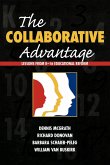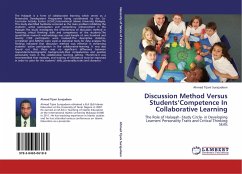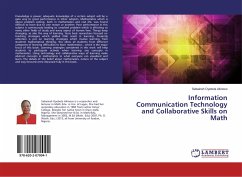Collaborative Action for Change presents new directions in the preparation and lifelong professional development of music educators. The book's chapters are based on some of the most effective presentations from the 2007 Symposium on Music Teacher Education.
Hinweis: Dieser Artikel kann nur an eine deutsche Lieferadresse ausgeliefert werden.
Hinweis: Dieser Artikel kann nur an eine deutsche Lieferadresse ausgeliefert werden.
Visionary educators realize that the preservice teachers we are grooming now must be prepared for tomorrow's schools. Technology is changing the way people communicate at an alarming speed and teaching strategies must accommodate and embrace those changesin order to arm new music educators with the skills they will need to succeed in future elementary schools, middle schools and high schools. Consequently, the leadership of MENC's Society for Music Teacher Education has forged ahead to provide cutting edge information for teachers and students. A quick review of the titles in these proceedings demonstrates that the 2007 SMTE Symposium presenters were looking into the twenty-first century and beyond the walls of established classrooms and ensembles familiar to most of us. Teachers who intend to step out of their comfort zone and broaden their perspectives will want to explore the concepts, ideas and recommendations in Collaborative Action for Change. I am grateful for the innovative guidance SMTEprovides for us all as we venture into uncharted territory in music education. -- Lynn Brinckmeyer, MENC past president; director of choral music education, Texas State University This collection of papers from the Proceedings of the SMTE 2007 conference represents some of the best thinking in music teacher education today. Built on issues related to practice, research and philosophical concerns, the authors capture differing perspectives and areas of interest, while putting forth ideas that articulate conceptual and curricular possibilities for music teacher education. That teacher development and collaborative partnerships form the core of papers is of no surprise. What is remarkable is the manner in which the collection is able to portray the complex nature of music teacher education, and how important it is for the profession to be informed and solidly grounded in a knowledge base that is itself complex and diverse. Well-organized and carefully edited, the Proceedings are a valuable professional resource-an important source for curriculum work and policy study and formation, as well as a guide for thinking about professional development in music teacher education.. -- Mark Robin Campbell, professor of music education, Crane School of Music, State University of New York at Potsdam For most of their history, music teacher education programs have been living in houses built by others: normal schools, conservatories, and liberal arts colleges. With the work of the Society for Music Teacher Education, those interested in the music education enterprise are envisioning new architectural structures to facilitate programs that fulfill the needs and vision of the profession. The 2007 SMTE Symposium proceedings provide a window into select pieces of this emerging blueprint that address not only elements of design but also the interaction among the "inhabitants" and their relationship with and contributions to their communities. -- Lizabeth Wing, professor of music education; head, Division of Music Education, College-Conservatory of Music, University of Cincinnati Visionary educators realize that the preservice teachers we are grooming now must be prepared for tomorrow's schools. Technology is changing the way people communicate at an alarming speed and teaching strategies must accommodate and embrace those changes in order to arm new music educators with the skills they will need to succeed in future elementary schools, middle schools and high schools. Consequently, the leadership of MENC's Society for Music Teacher Education has forged ahead to provide cutting edge information for teachers and students. A quick review of the titles in these proceedings demonstrates that the 2007 SMTE Symposium presenters were looking into the twenty-first century and beyond the walls of established classrooms and ensembles familiar to most of us. Teachers who intend to step out of their comfort zone and broaden their perspectives will want to explore the concepts, ideas and recommendations in Collaborative Action for Change. I am grateful for the innovative guidance SMTE provides for us all as we venture into uncharted territory in music education. -- Lynn Brinckmeyer, MENC past president; director of choral music education, Texas State University This collection of papers from the Proceedings of the SMTE 2007 conference represents some of the best thinking in music teacher education today. Built on issues related to practice, research and philosophical concerns, the authors capture differing perspectives and areas of interest, while putting forth ideas that articulate conceptual and curricular possibilities for music teacher education. That teacher development and collaborative partnerships form the core of papers is of no surprise. What is remarkable is the manner in which the collection is able to portray the complex nature of music teacher education, and how important it is for the profession to be informed and solidly grounded in a knowledge base that is itself complex and diverse. Well-organized and carefully edited, the Proceedings are a valuable professional resource-an important source for curriculum work and policy study and formation, as well as a guide for thinking about professional development in music teacher education. -- Mark Robin Campbell, professor of music education, Crane School of Music, State University of New York at Potsdam








